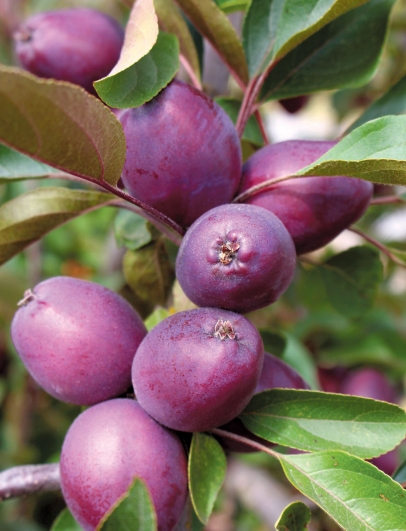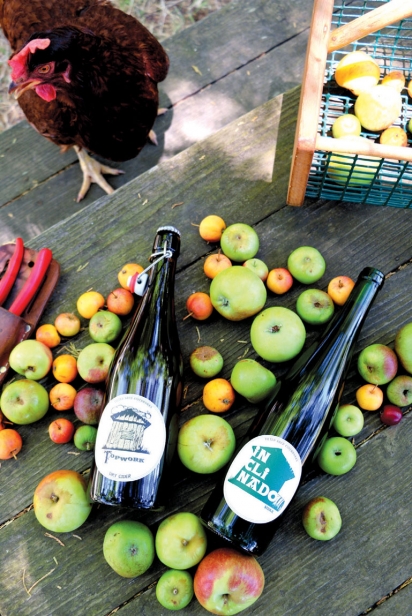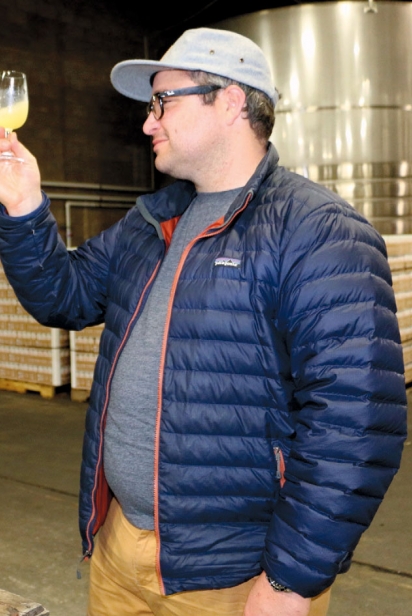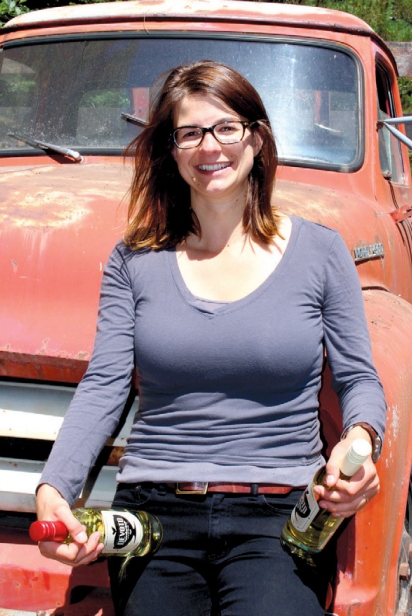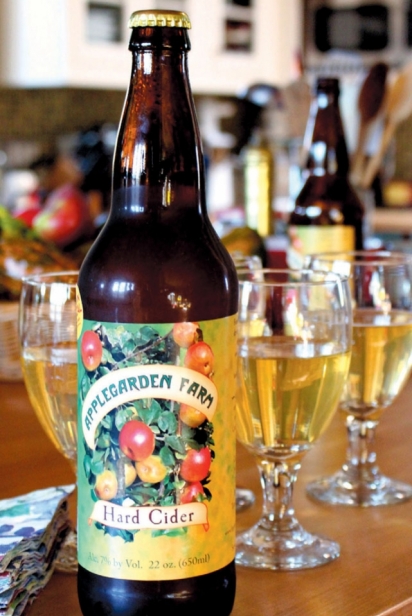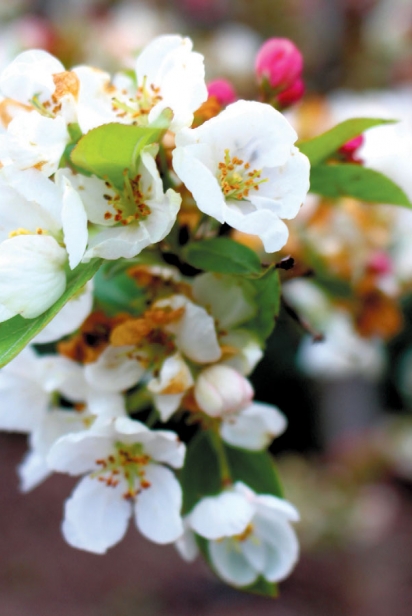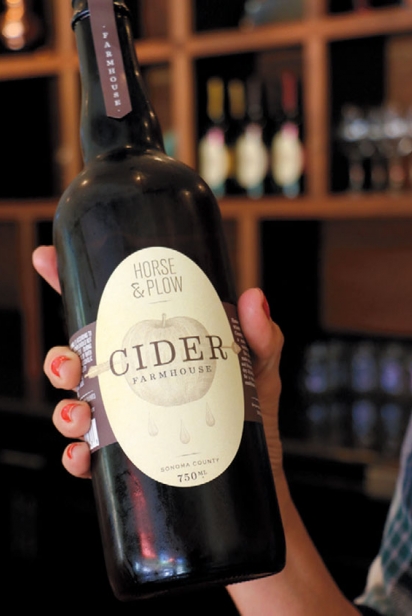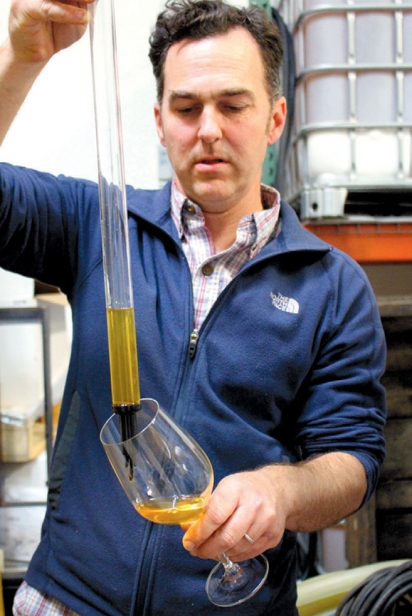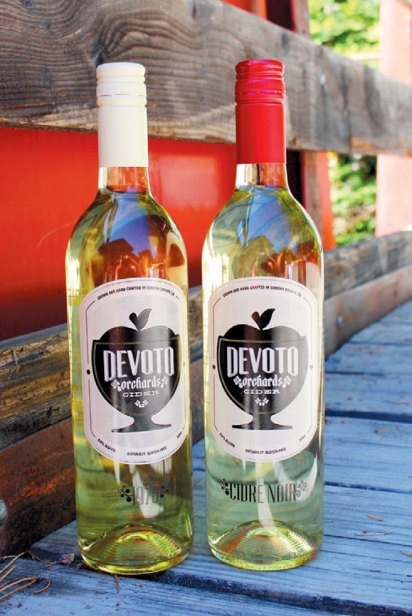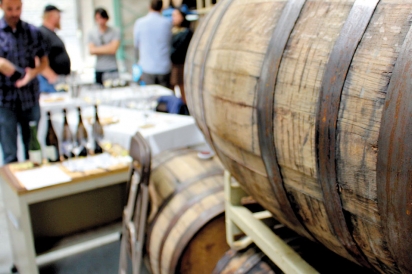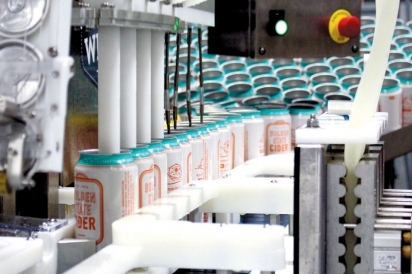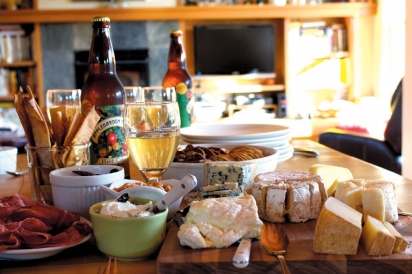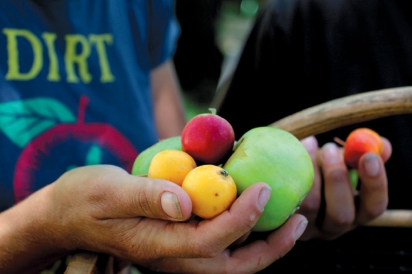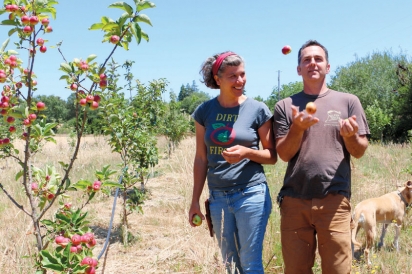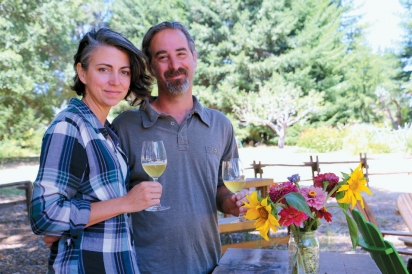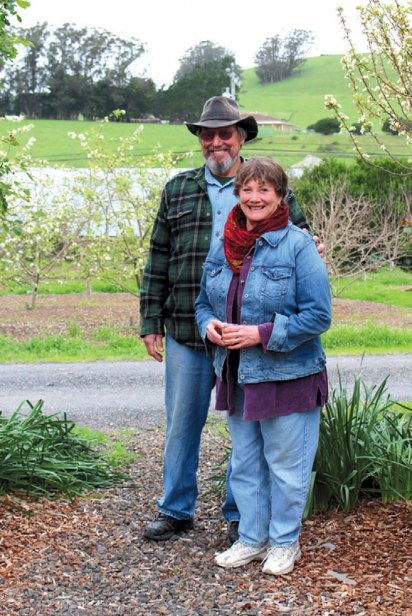Hard Core
Four North Bay Cider Makers Who Are Shaping the Artisan Cider Movement
For over a decade, hard cider has been experiencing a remarkable revival in the American market. This age-old beverage, which arrived in the Americas with British colonists, has been around since the ancient Greeks and Romans first stumbled upon English villagers drinking an alcoholic beverage made from apples in 55 BC. Though once consumed daily at all meals, cider was dealt a death blow among U.S. consumers during Prohibition in the 1920s and remained in obscurity until its recent resurrection.
The resurgence of cider’s popularity in the U.S. can be attributed to three major influences: the microbrew boom in the 1990s, which renewed interest in fermentation; a rise in the Slow Food movement; and the increased demand for gluten-free products. While cider’s primary demographic still skews toward 20-to-30-something millennials, the drink has gained momentum among men and women across all age groups.
Commercial spirit companies like Sebastopol-based Ace Cider, Boston Beer Company’s Angry Orchard and Anheuser-Busch were some of the first to jump into the mass market with a host of mostly overly sweet, fruit-forward products made from concentrate. Eventually, a handful of craft producers began introducing authentic, drystyle beverages fermented from heirloom apple varietals. Connoisseurs started to take notice.
Alan Shapiro, founder of the Cider Summit festivals, has seen huge industry growth since 2010. “At first we struggled to get a decent assortment of ciders to taste,” he remembers. “There were only a few cideries at that time. About 450 people showed up at our first festival in Seattle to sample 45 ciders, which were primarily a mix of imports from around the world.”
In contrast, this year’s San Francisco Cider Summit in the Presidio featured over 50 regionally based craft cideries showcasing over 200 different ciders to around 2,500 attendees.
North Bay–based cideries Tilted Shed Ciderworks, AppleGarden Farm, Golden State Cider and Horse & Plow are examples of the craft at its best. In addition to making a splash in their industry, these artisans are helping revitalize Sonoma and Marin counties’ dwindling heirloom apple orchards and creating distinctive, value-added brews from the fruits of their labor.
Tilted Shed Ciderworks, Windsor
What happens when a master intaglio printer and a former book editor decide to ditch the urban rat race and become craft cider makers? Ask East Bay natives Scott Heath and Ellen Cavalli, the dynamic husband-and-wife duo behind Tilted Shed Ciderworks in Windsor. Their mutual passion for hard cider grew out of a desire to put down roots and embrace a lifestyle connected to community and the earth.
The couple’s unlikely journey began in 2007 on a two-and-a-half-acre farm property near Santa Fe, New Mexico. Heath and Cavalli had spent most of their relationship straddled between the East Coast and the Southwest in an effort to juggle the demands of hectic careers. Embracing the need for change, they gave notice at their respective jobs, “bought the farm” and settled into a new rural lifestyle growing organic vegetables, welcoming their first child and freelancing from home.
As fate would have it, the land had a small apple orchard that produced a bumper crop that fall. In an effort to salvage the surplus harvest, Heath decided to make cider. “We had no idea what we were getting ourselves into,” he says, looking back.
They purchased a barrel press and set to work grinding and pressing bushels of fruit. They let the juice slowly ferment in the barn through the cold winter months, and held their breath when they cracked open that inaugural effort. What they tasted surprised them.
“The finished cider was dry and lightly effervescent,” Cavalli recalls. “It was a revelation.” In the months that followed they began learning everything they could about making cider as hobby turned to obsession. They knew they were on to something.
In 2010, they packed up their belongings and moved back to the Bay Area to be closer to family and open their own cidery. They settled on five and a half acres of farmland off the Gravenstein Highway in the heart of Sonoma County apple growing country.
Tilted Shed Ciderworks opened the following year and began crafting small-batch ciders from 100% locally grown, organic heirloom apples. Its inaugural vintages included Graviva!, an earthy, semi-dry blend of local Gravensteins and traditional cider apples; Lost Orchard, a dry, tannic cider made from gleaned rare heirlooms and cider varietals; and Smoked, described as an “experiment gone awesome” with a combination of fresh-pressed and wood-smoked apples.
In the last five years, Heath and Cavalli have expanded their original line considerably and introduced a series of extremely rare limited edition ciders.
From the outset, the couple’s vision for their cider was decidedly different. Instead of making sweet, apple-centric beverages that catered to the masses, Tilted Shed vowed to glorify the regionality of the apples—teasing out complex and unexpected layers of flavor on the palate that surprised and delighted their growing audience. Luminous, silky and voluptuous are not words one would generally associate with cider, but then again, Tilted Shed’s ciders are bringing sexy back.
“Until recently, Americans haven’t appreciated where their apples come from,” says Cavalli, “but Scott and I are committed to making cider that is an authentic expression of our unique Sonoma County terroir.”
Tilted Shed ciders quickly gained a devout following amongst aficio nados despite its strategic decision to avoid showcasing products in industry competitions.
“Back in 2012, we entered our first, and last, cider competition,” says Cavalli. “The judges said Lost Orchard should be sweeter, less tannic and more ‘apple-y’. It was our first of many existential crises as cider makers. We asked ourselves, ‘Do we make cider geared toward widespread appeal and sales, or do we let our apples lead the way even if that means limiting our financial success?’ We chose to follow our heart and create something we’re proud of.”
Heath prefers to remain behind the scenes as orchardist and head cider maker, while Cavalli has emerged as the brand’s vocal spokesperson. A self-anointed “cider evangelist,” she enthusiastically crusades to educate the public about what real cider is and, more importantly, what it is not. Her zeal has brought many converts to Tilted Shed’s tasting room in Windsor for cider talks and tasting events.
“Too often, cider producers deliver what wins medals and what those with narrow cider experience have come to expect,” Cavalli says. “We’re not giving people what they think they want. We’re giving them what the apples want to be.”
Always open to experimentation, Cavalli and Heath are preparing a new release in collaboration with two Sonoma County–based distilleries this fall. They are excited to focus attention on apple brandy and Pommeau, an aged blend of apple brandy and apple juice that originated in France.
“Apples and time is our mantra,” says Cavalli. “We’re aiming to put Sonoma County on the map for cider.”
AppleGarden Farm, Tomales
Cider making wasn’t on the radar when Jan and Louis Lee pictured retirement after more than 25 years in commercial construction management. They were looking for peace, quiet and a simpler lifestyle in the country when they settled on three and a half acres of bare farmland outside the remote West Marin town of Tomales in 2007.
The property was a dream come true: a place to build their final home with plenty of space to grow their own food. In fact, more than enough space. “We started thinking about how to make the best use of our land,” says Jan. “A lot of other people were growing grapes, but we wanted to do something different.”
They soon discovered the coastal microclimate of their property mirrored that of the popular apple-growing region in nearby Sonoma County. That’s when the seed idea to make cider took root.
They started by planting a two-acre orchard with a mix of early, medium and late harvest heirloom cider varietals in hopes of producing an artisan cider that would offset the expense of maintaining the trees. After three years of research and several experimental batches to perfect the recipe, the Lees released their signature AppleGarden Farm Cider in 2012. It was an instant hit. The semi-dry, lightly sparkling field blend is handcrafted from 100% estate-grown “Old World” cider varietals, with no added sugar or concentrate. Jan describes it as “delicious with tart notes and a lush mouthfeel that best complements savory foods like full-bodied artisan cheeses, briny oysters and charcuterie.”
Today, the Lees’ small farmstead cidery is the epitome of a tree-to-bottle operation. Their starter orchard has expanded to include 40 varietals of organically grown heirloom apples which they hand harvest, process, ferment into cider, bottle and distribute themselves to a few select local retailers and restaurants. Their hard work recently earned them a silver medal at the Dan Berger International Cider Competition, which drew several hundred cider makers from around the world—an affirmation that they can hold their own in the marketplace.
“All of the apples we grow go into our cider,” says Jan, noting with pride that they are currently the only cider makers in Marin County. Nothing is wasted in production: Even the apple pomace leftover from each press goes to feed neighbors’ livestock and the native wildlife. The orchard is also a haven for the couple’s flock of laying hens that freely roam the rows providing natural insect control and nitrogen- rich fertilizer.
The Lees are content to keep production small and distribution hyper-local. “We do one product and we do it really well,” says Jan. “For us it’s all about quality not quantity.”
Golden State Cider, Sebastopol
“To make the best cider, your family tree better be ... well ... an apple tree,” says Jolie Devoto Wade.
Jolie certainly fits that bill. As the daughter of Sebastopol apple growers, her passion for cider grew from a desire to continue the work her parents started 40 years ago on their 26-acre farm in west Sonoma County. Visionaries Stan and Susan Devoto were Berkeley transplants who moved to the North Bay in 1976 and began cultivating organic vegetables, flowers and over 55 varieties of heirloom apples at their Devoto Gardens & Orchards property.
Jolie and her two sisters grew up in the family business and spent long hours in the orchard helping her parents hand harvest and pack their apples for market. She thought the farm was paradise. “In my mind, I think I always knew I’d come back here one day,” she says.
But in the last decade the future of the business had grown tenuous. Thousands of acres of established apple orchards in the region had been purchased by winemakers who replaced trees with vines. As the market for apples waned, it had become increasingly difficult for farms like Devoto Gardens & Orchards to remain profitable.
Luckily, Jolie stumbled upon the perfect solution when she fell in love with her future husband and business partner Hunter Wade, after college. Wade hailed from a ranching family in Maryland, and had discovered Northern Spain’s ancient cider culture during travels abroad.
“Timing is everything,” Jolie says, smiling. “I was looking for a way to save the family business, and he couldn’t stop talking about cider.” Coincidentally, American cider consumption was on the rise for the first time since Prohibition. It was kismet.
Together they returned to Spain’s renowned Asturias province where they sought out local cider masters to teach them the craft of fermenting authentic Spanish sidra. The life-changing experience sparked plans to start their own cidery back in Sebastopol. The idea was to put Devoto’s heirloom apples to good use and generate a new profit center to make the business sustainable in the changing market. Cider was the answer to a prayer.
The couple returned home and sealed their partnership with a wedding in the Devoto orchards in the fall of 2012. It was the height of the apple harvest, and the newlyweds immediately threw themselves into making their first small-batch offering. They rolled the dice with their debut release, Save The Gravenstein, which paid homage to the vanishing Sonoma County heirloom of the same name.
“A lot of people told us we couldn’t do a good cider with Gravensteins because they lack the classic tannic backbone of bittersweet and bittersharp cider varietals,” says Jolie. “Thank goodness we had a healthy disrespect for tradition!”
Within weeks, the first production sold out completely and garnered a bronze medal at the prestigious Great Lakes International Cider & Perry Competition.
With the sweet taste of success in their mouths, Jolie and Hunter set their sights on expanding the Devoto Orchards Estate Cider line. In addition to Save The Gravenstein, they rolled out a mid-season field blend called 1976 made from 17 of the original heirloom apple varieties planted by Jolie’s parents on their farm, and a bold late-season Cidre Noir (black cider) with a blend of five unique black heirlooms. Customers swooned, and the awards kept rolling in.
In 2014, after just two years in production, demand for Devoto Orchards Estate Cider had surpassed the farm’s capacity to grow apples for its product. Undaunted, the couple decided to rethink their vision and ramp up production to meet the growing thirst for their ciders. Sister company Golden State Cider was born that same year and effectively merged the original artisanal estate line and the couple’s new Mighty Dry Cider line under one umbrella.
To address the need for more space, Jolie and Hunter leased a 4,000-square-foot warehouse in an old apple processing facility near downtown Sebastopol and installed an automated canning line. “We liked the idea of cider in cans that is easy to take wherever we go,” says Jolie. “Our audience echoed that sentiment.”
The company’s flagship Mighty Dry Cider is a food-friendly beverage with a clean, crisp taste. Available in four-pack cans, it is made from 100% fresh-pressed culinary apples sourced in California, Oregon and Washington State with no added sugar or concentrates.
“We set out to make a cider with simple ingredients and uncompromising flavor,” says Jolie.
They seem to have hit their mark. In 2015, Golden State Cider released nearly 70,000 gallons of Mighty Dry to select Bay Area retailers with rave reviews. This year the brand expanded distribution to Southern California and added two more ciders to the line: Mighty Hops, infused with dry hops at the end of fermentation to yield a smooth, non-bitter taste; and Gingergrass, made with a mildly spicy blend of puréed ginger root and dried organic lemongrass.
“Cider can be a beautiful vehicle for other flavors,” says Hunter. “We’ve been careful not to overpower the subtle nuances of the apples.”
By the end of the year, Golden State Cider will release around 200,000 gallons of hard cider—more than double last year’s production. Their success coincides with Devoto Gardens & Orchards’ 40th anniversary growing organic, heirloom apples in the heart of Sonoma County. What started as a dream has become a very tangible reality. “Our goal was to make the business sustainable so we could carry my parents’ legacy forward,” says Jolie. “Cider is making that possible for us.”
Horse & Plow, Sebastopol
Seasoned winemakers Suzanne Hagins and Chris Condos are newcomers to the local cider scene, but not to the craft (and business) of fermented beverages.
Condos, a Bay Area native, graduated from the esteemed UC Davis viticulture program and started making wine in 1997 at Pine Ridge Vineyards in Napa. He eventually launched his own nationally distributed label, Vinum Cellars.
Hagins hails from South Carolina, where she started her career in food and beverage service. She moved to California in 2000, and worked her way up in the wine business from a cellar position at DeLoach Vineyards to assistant winemaker for Golden Eye Winery in the Anderson Valley.
The couple combined their considerable knowledge and resources to start Horse & Plow in 2008, with an eye toward using Old and New World techniques to handcraft their boutique wines and dry ciders from locally sourced organic fruit.
“Cider is a beverage that represents the diversity of Sonoma County,” says Hagins. “We wanted to celebrate local apples and support farmers who use healthy, biodynamic practices to grow these incredible heirloom varietals.”
A bumper crop of local apples in 2013 served as inspiration to make their first experimental batch of cider. The resulting 50 cases were shared among friends and family. In 2015, Horse & Plow produced nine times that quantity, and this fall they are on track to release about 600 cases.
Hagins and Condos start with apples grown and harvested in Sonoma and Mendocino counties, then carefully blend the varietals for optimal balance and structure. Each cider is fermented in neutral oak barrels, with just a touch of added sugar (or honey) and champagne yeast, then bottle-conditioned to a very dry finish.
The process to make good cider is similar in many ways to crafting beautiful wine, but there were still some surprises. “Chris and I have almost 40 years of combined winemaking experience,” says Hagins, “but cider was very humbling. We’ve certainly gained a healthy respect for the art that goes into it and learned a ton in the process!”
Thus far, Horse & Plow has produced three offerings: Farmhouse, a rustic blend of 12 varietals from local orchards; Heirloom, made from classic heirloom cider apples; and Hops & Honey, with citrus and floral notes. This fall the cidery will roll out its first orchard-designate release called Oz, which showcases organic, single varietal Belle du Boskoop apples from Oz Farm in Point Arena.
Horse & Plow ciders are available at select local retailers and at the winery’s tasting room, which opened to the public in July. The beautiful two-acre facility and grounds is the perfect destination to sample their signature wines and cider.
“Cider attracts a diverse, enthusiastic and open-minded group of people,” says Hagins, “and our fellow cider makers have welcomed us with open arms. We are excited to be a part of this community.”
Slow Food Russian River will host an Apple Tourismo event on September 10, featuring a farm tour, tasting and lunch at Devoto Orchards with Tilted Shed Ciderworks and Devoto Orchards Estate cider. Attendees will also be able to use Slow Food Russian River’s Community Apple Press to press their own apples. SlowFoodRR.com


